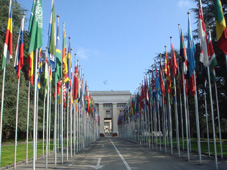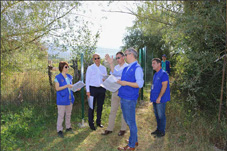
Co-Chairs of the GID publish a statement regarding Gugutiantkari
By Tsotne Pataraia
Thursday, August 29
On August 28, the Co-Chairs of the Geneva International Discussions (GID) published a joint statement regarding the developments in the village of Gugutiantkari. The case concerns the actions of Russian occupation forces, who have erected a so-called border in the village of Gugutiantkari in Gori Municipality.
A statement issued on behalf of the co-chairs - the European Union, the OSCE and the UN - says the current situation increases tensions and restricts human rights.
“Recent developments in Gugutiantkari area have raised tensions on the ground and have humanitarian consequences to the local people. As with all such fencing, the newly erected structures hinder freedom of movement for people living there, preventing them from reaching their orchards and threaten access to irrigation water,” reads the joint statement of the co-chairs of the Geneva International Discussions.
Apart from publishing a statement, on August 28, the Co-Chairs of the Geneva International Discussion, Toivo Klaar (EU) and Rudolf Michalka (OSCE), arrived in Gugutiantkari, where the occupation regime continues the process of fencing.
In a statement posted on Twitter, EU Special Representative for the South Caucasus and the crisis in Georgia, Estonian diplomat Toivo Klaar thanked the Head of the EU Monitoring Mission in Georgia, Eric Hogg, for his guidance and informative visit to the village of Gugutiantkari and condemned fencing: “Fencing divides communities and causes hardship. Borderisation cannot be accepted," states Klaar.
The head of the EU Monitoring Mission in Georgia, Eric Hogg also tweeted about his arrival in Gugutianthkari with two co-chairs of the Geneva talks and expressed his concern about the situation: “New fencing further divides communities,” tweeted the diplomat.
The visit of the diplomats is one of the Geneva International Discussions Co-Chairs’ various efforts to cope with potential consequences of such and other kinds of events. It precedes a meeting under the auspices of the European Union Monitoring Mission (OSCE-EUMM) which will take place in Ergneti, on August 29, within the frameworks of Incident Prevention and Response Mechanism (IPRM).
Incident Prevention and Response Mechanism (IPRM) is set of meetings, that allows discussing such issues, as the identification of potential risks, the follow-up of incidents and the exchange of information, as well as problems affecting the communities daily. The IPRM was created in February 2009 as a result of the Geneva Discussions that followed the 2008 conflict in Georgia. Its main goal is the rapid response on concrete and specific incidents, such as the recent developments in Gugutiantkari.
Ggutiantkari case, where Russian occupation forces installed barbed wires, leading two houses to end up beyond the control zone of the Georgian government is just one manifestation of the actions that occupation regime has been carrying out since 2011, aiming to take control of Georgian soil using “creeping occupation”, installing so-called borders and thus expanding separatist-controlled territories, beyond the borders of occupied Abkhazia and Tskhinvali Region.


